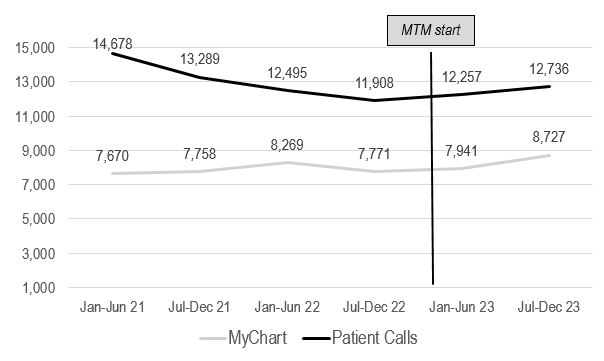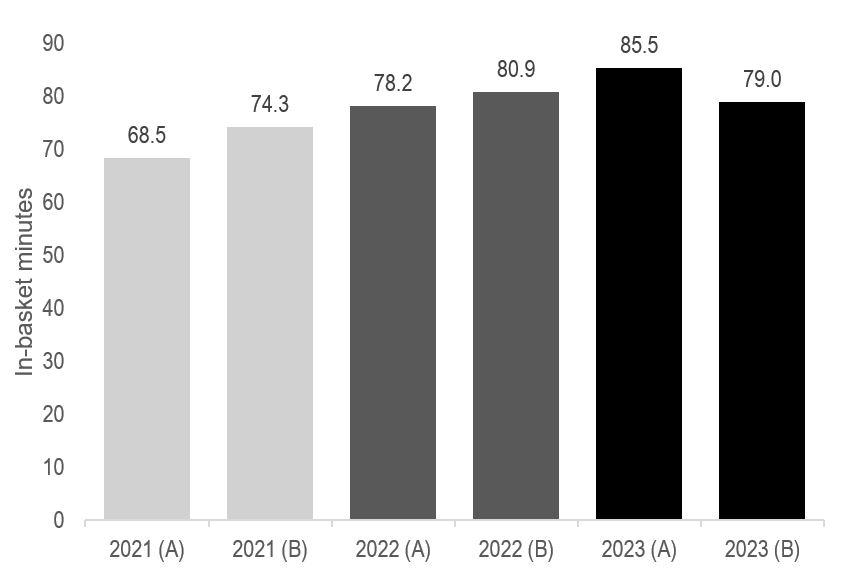Session Information
Session Type: Poster Session B
Session Time: 10:30AM-12:30PM
Background/Purpose: Clinical demands have grown, in part, from rising use of patient portals, while traditional clinic nurse triage has focused on phone-based care. We sought to implement a mature-the-message (MTM) standard for patient portal (My Chart) encounters where, just as with phone encounters, clinical triage for resolution or orders would be cued prior to forwarding messages to providers. Our goal was to reduce messages sent to providers by 20% and evaluate if this would reduce provider inbox time.
Methods: This pre-post study gathered electronic health record (EHR; Epic) data from one academic rheumatology group from 1/1/2021-2023, including 1/2023 implementation of nurse MTM. Nurse and provider operations leaders shared the new standard and co-designed examples in a nurse huddle. We also encouraged providers to acknowledge and share appropriate and exceptional examples of matured messages. Initial implementation volumes were calculated bimonthly, and overall message volumes and inbox time were examined in half-year increments to evaluate changes over time.
Results: During implementation with nurses, we shared that from 2021 to 2022 phone encounters fell by 2,770 (20%, Fig 1), while EHR portal messages rose, necessitating triage support with the goal to reduce forwarded messages by 20%. Baseline data showed that 74.6% (878/1178) of unique portal messages were routed to providers two months before implementation. Two months after, the volume of messages routed to providers fell to 70% (1068/1534), and to 50% (806/1616) four months later (difference vs baseline 24.6% (CI 21.1-28.0%), p< 0.0001). In just four months after MTM began, nearly 500 fewer messages were routed to providers (476 reduced by MTM; total 1276 messages resolved by nurses/staff).
During the 2023 intervention year, both phone and portal message total volumes increased (Fig 1), and provider inbox time increased through early 2023, peaking at an average of nearly 90 minutes per 8-hour clinic day (Fig 2). Post implementation, for the first time, providers’ average inbox time decreased by 6.5 minutes per day, bending that rising curve.
Conclusion: Implementing a mature-the-message as a nurse triage standard in a rheumatology group associated with 6.5 minutes per day reduced inbox time for providers. Multiplied over a 5-day week that is >32 minutes a week, and over a year, this could save 28 hours per full-time provider. Similar programs could be disseminated and studied to advance the quadruple aim of improving patient care, experience, cost, and provider wellbeing.
To cite this abstract in AMA style:
Bartels C, Ferguson S, Campbell C, Zemlicka L, Weber A, Holt A, Trowbridge E. Bending the Curve on Inbox Bloat: A Patient Portal Project to Mature-the-Message via Nurse Triage to Reduce Provider Inbox Time [abstract]. Arthritis Rheumatol. 2024; 76 (suppl 9). https://acrabstracts.org/abstract/bending-the-curve-on-inbox-bloat-a-patient-portal-project-to-mature-the-message-via-nurse-triage-to-reduce-provider-inbox-time/. Accessed .« Back to ACR Convergence 2024
ACR Meeting Abstracts - https://acrabstracts.org/abstract/bending-the-curve-on-inbox-bloat-a-patient-portal-project-to-mature-the-message-via-nurse-triage-to-reduce-provider-inbox-time/


